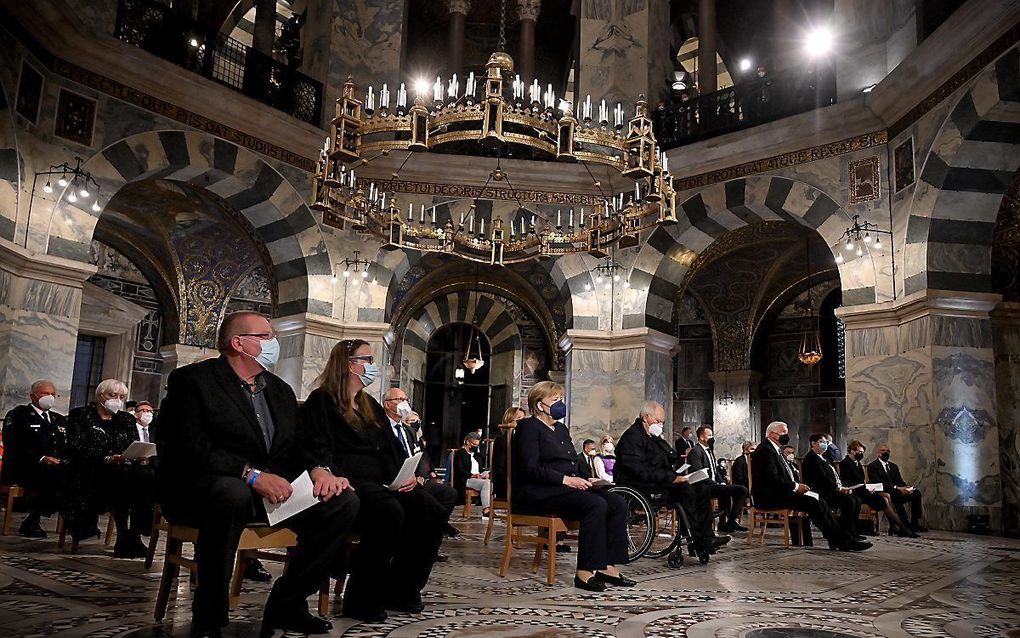Psalms of lament to commemorate flood victims Germany
01-09-2021
Central Europe
From our reporter, RD

beeld AFP, Oliver Berg
Central Europe
Over 200 people died in the floods in Germany, Belgium and the Netherlands last month. The victims of the natural disaster were commemorated on Saturday in the ancient Dom church in Aachen. “Psalms of lament can give strength and confidence.”
The night of July 15th to 16th, Renate Steffes experienced up close. “I was standing with my feet in the water,” says the woman from Bad Neuenahr-Ahrweiler, Germany. “And the water kept rising. I was terrified.”
The consequences of the floods are becoming more evident every day, according to the German. “Letters, photos, videos of the children, souvenirs from the Holy Land: all gone.”
After seven weeks, there are still mountains of waste on the street, says Steffes. “And then there’s the stench and the lack of fresh tap water. We can calculate that billions are needed to repair the material damage. But what does it take to deal with the emotional losses and fears?”
Ahr-Psalm
The images of the rising waters of the River Ahr are also still vivid in Bishop Georg Bätzing’s eyes. “And that’s why we are here, in the Cathedral,” says the chairman of the German bishops’ conference. “To commemorate the victims of the flood disaster.”
Heinrich Bedford-Strohm, council president of the Evangelical Church in Germany: “We remember them in our prayers. Today we want to pay attention and compassion to the people who suffered from the floods.”
Then in the octagonal Palatine Chapel, built around the year 800 by order of Emperor Charlemagne, a psalm of lament is heard. “I want to scream at you, God, with a wounded soul. My words, however, freeze on my tongue. It’s cold inside me; all feelings have died, my eyes stare at my broken world.”
They are words from the Ahr-Psalm, written by priest Stephan Wahl. He is from the German Ahr valley as well. There where the high water dragged everything along.
“You who hold our time in Your hands,” sings cantor Marco Fühner. “Be merciful, give the strength to withstand the agony of death.”
The choir of the Aachener Dommusik, with 26 singers, answers: “You are God, our God, our refuge.”
Bottomless
Bishop Bätzing points in his sermon towards the power of prayer and the Psalms. “When I am speechless, I rely on familiar words and prayers—the Lord’s Prayer, the Rosary, a word from Sacred Scripture – and often the Psalms. To pray with the Psalms means to speak clear words, to obscure nothing and yet to hope. I hear again and again how many victims recognize themselves in the psalms of lament.”
Bedford-Strohm emphasizes in his sermon that people can also experience God amid floods. “But not as the One Who pressed the flood button, but as the One Who cried out with the victims, Who suffered with them, Who carried them in the abysses that opened.”
According to Bätzing, God can also be “experienced” in the people who helped clear the rubble, in the pastoral workers who gave comfort. “And if we run out of words ourselves, we can borrow them. For hundreds of years, people have brought their distress to God, praying in Psalm 69: “Deliver me, O God, for the waters have come down to the soul. I have sunk in bottomless mud, where one cannot stand; I have come into the depths of the waters, and the flood overflows me.” Such words cannot “pray away” the flood. They can give you strength and confidence.”
Chancellor
The memorial service was attended by, among others, German Chancellor Angela Merkel, Federal President Frank-Walter Steinmeier, Parliament Speaker Wolfgang Schäuble and various victims and aid workers. Rev. Sophie Bloemert was present on behalf of the Council of Churches in the Netherlands.
The floods in Europe in July 2021 were a result of persistent rain showers. Several rivers overflowed. The German states of North Rhine-Westphalia and Rhineland-Palatinate, the Belgian province of Liège and the Dutch province of Limburg were particularly hit hard. More than 200 people died in the natural disaster, at least 180 of them in Germany and 40 in Belgium.
This article was previously published in Dutch daily Reformatorisch Dagblad on August 28th, 2021.


